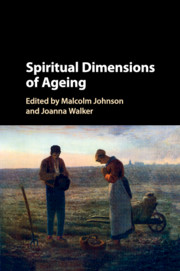Book contents
- Frontmatter
- Contents
- List of Contributors
- Preface
- Acknowledgements
- 1 Spirited Ageing
- Part I The Spiritual Journey of Ageing
- Part II Cultures of the Spirit in Modernity
- Part III Searching for Meaning in Later Life
- Part IV Meeting Spiritual Needs in Older Age
- 14 Conversation Matters
- 15 Spiritual Development in Later Life: A Learning Experience?
- 16 Reimagining the Theology of Old Age
- 17 Pressing towards the Finishing Line: Supporting Older People on Their Final Lap
- Index
- References
16 - Reimagining the Theology of Old Age
from Part IV - Meeting Spiritual Needs in Older Age
Published online by Cambridge University Press: 22 December 2016
- Frontmatter
- Contents
- List of Contributors
- Preface
- Acknowledgements
- 1 Spirited Ageing
- Part I The Spiritual Journey of Ageing
- Part II Cultures of the Spirit in Modernity
- Part III Searching for Meaning in Later Life
- Part IV Meeting Spiritual Needs in Older Age
- 14 Conversation Matters
- 15 Spiritual Development in Later Life: A Learning Experience?
- 16 Reimagining the Theology of Old Age
- 17 Pressing towards the Finishing Line: Supporting Older People on Their Final Lap
- Index
- References
Summary
Introduction
In this chapter we shall explore how best to put theology to use when considering the nature of age and ageing in both ourselves and other people. The main body of this chapter consists of sketching out the shape of how theology might hold a number of important questions in order to both imagine age and seek a deeper and more insightful sense of the role of older people in both church and society (Woodward 2008). It continues a significant theme of this volume which is, that in imagining age, we cannot claim any complete or absolute framework of theology. Rather, these questions are scaffolding that support an exploration of how theology might be put to work in relation to our growing older. I begin with a story from my own experience. The reader is invited to enter imaginatively into this short narrative. This is followed by an intriguing extract from an interview with Carl Gustav Jung, which acts as a starting point for considering what we believe might help good ageing.
Who Is That in My Mirror?
I used to live in an affluent part of the West Midlands in the United Kingdom. Solihull was a borough full of affluent communities housing high achievers. The culture was busy, demanding and life could be stressful for these families. For some, the constant activity was chosen but for many it was deeply woven into the fabric of modern life. The constant flow of information and the need to be always on the move have the power to both satisfy and frustrate. In this culture, age and ageing have been marginalised such that older people seem not to be part of it.
Let me take you back to the local town where I shopped, or rather drove through, on my way to somewhere else. I am late for a meeting in Birmingham and I cannot find my mobile phone to let my colleagues know that I am behind. I negotiate a busy junction and then meet a pedestrian crossing. There are three cars in front of mine. My eyes catch the sight of an old man waiting to cross. He hesitates and then moves back while none of the cars ahead let him pass. I decide to let him cross even as my anxiety levels about the meeting continue to rise.
- Type
- Chapter
- Information
- Spiritual Dimensions of Ageing , pp. 270 - 282Publisher: Cambridge University PressPrint publication year: 2016

